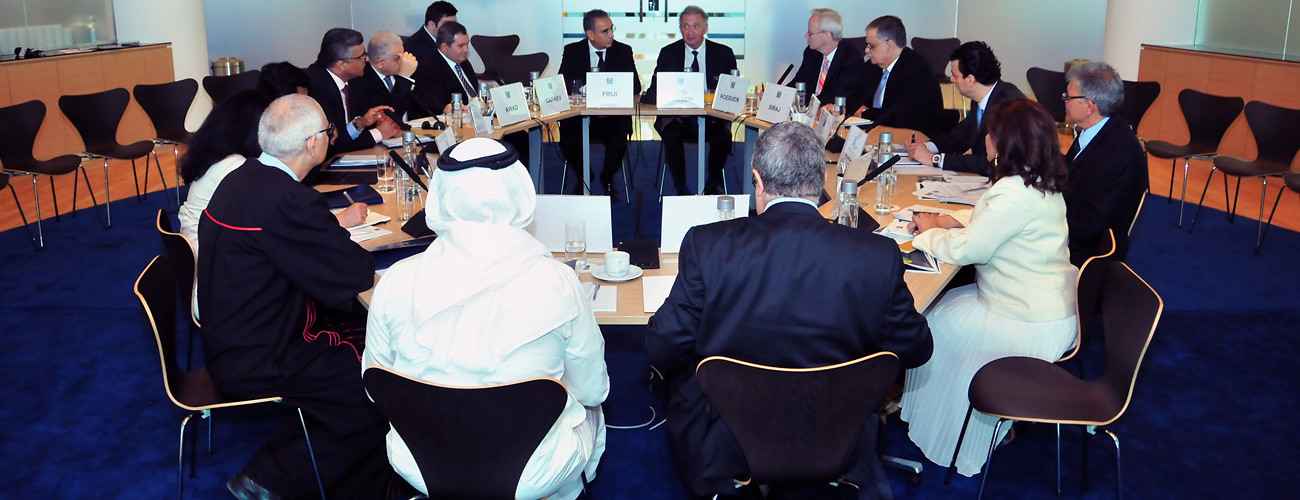The inaugural meeting of IPI’s Middle East and North Africa (MENA) Advisory Council was held on Thursday, April 2nd, 2015. Sixteen members of the diplomatic and business communities, religious leaders from among Christian, Jewish, and Muslim faiths, among others, as well as civil society members, were in attendance for the meeting. Advisory Council members and additional distinguished guests gathered at a reception held at IPI’s offices immediately following the meeting.
IPI President Terje Rød-Larsen gave a presentation on global mega trends that pose risks and challenges to global peace, security, and stability. The presentation made comparisons and links between the extremist movements of today, including ISIS, al-Qaeda, the Houthis in Yemen, and state-backed militias such as Hezbollah, with Europe’s Nazi, fascist, and Stalinist movements of the early 20th century.
The presentation highlighted historical examples, going back to Christian fundamentalism in the 16th century, which were strikingly similar in ideology and action with the ones we see today. He emphasized that what all these extremist and violent ideologies, occidental and oriental, are representing is a totalitarian mentality that builds on a confused conception of a utopian paradise on Earth, and a belief that terrorism is not only a legitimate, but a necessary means to achieve these objectives. He concluded that politicized religion and totalitarian mentalities are not exclusive to present-day misused and politicized Islam.
Mr. Rød-Larsen further gave a comprehensive overview of the key global challenges that face states and multilateral institutions today, including population shifts, migration, fragile states and cities, sustainable development, climate change, terrorism, and beyond. In response to these challenges, the institute has launched a new initiative called the Independent Commission on Multilateralism (ICM), which will produce an in-depth analysis of the key trends. Its primary aim is to identify urgently required policy proposals to enhance the multilateral system’s ability to respond to contemporary and long-term challenges.
The Commission is chaired by Kevin Rudd, the former prime minister of Australia, and its secretary-general is Hardeep Singh Puri, former permanent representative of India to the UN. Bahrain’s Foreign Minister Shaikh Khalid Bin Ahmed l-Khalifa is a member of the ICM’s Ministerial Board.
The MENA Advisory Council was established in order to assist IPI’s recently opened Middle East and North Africa Regional Office and is comprised of distinguished individuals in the field of international affairs, business, and civil society. The Council will provide advice with respect to research, analysis, policy development, outreach, convening, and other programmatic activities of IPI.
In April 2014, the institute opened its Middle East and North Africa office located in Manama, Bahrain. The office was established in Manama to promote policy research on global peace and security within the Middle East region. The director of IPI’s MENA office is Mr. Nejib Friji.
Some of the work of IPI’s MENA office includes:
- Increasing the focus on issues of the region that contribute to the international community‘s efforts to strengthen the collective capability regarding conflict prevention, multilateral diplomacy, mediation, peacekeeping, and peacebuilding;
- Addressing critical challenges within the region, such as armed conflict, state fragility, political extremism, humanitarian crises, transnational organized crime, terrorism, and energy security; and
- Seeking regional partnerships in support of peace, security, and development.
The Council will meet once a year in Manama for a far-reaching discussion on current activities and future work.








